Difference between revisions of "Poems on Witty Subjects in Congress"
(→"A Commissioner, to the People of Philadelphia," by William Ellery) |
(→"A Commissioner, to the People of Philadelphia," by William Ellery) |
||
| Line 295: | Line 295: | ||
<strong>E</strong>'re too late to flee from impending Perdition<br /> | <strong>E</strong>'re too late to flee from impending Perdition<br /> | ||
'''W'''ho like me to the King Allegiance will swear<br /> | '''W'''ho like me to the King Allegiance will swear<br /> | ||
| − | + | '''A'''nd future Submission to Congress forbear<br /> | |
| − | + | '''L'''eave all his old Friends to the Parliaments Fury<br /> | |
| − | + | '''L'''et Rebels be hang'd without Judge or Jury<br /> | |
| − | + | '''E'''scapes condemnation to gibbet or halter<br /> | |
| − | + | '''N'''or needs forfeiture fear unless times should alter. | |
|} | |} | ||
| | | | ||
| Line 311: | Line 311: | ||
| style="width: 550px; white-space: nowrap; margin: 20px 0 20px 20px; background-color: #f9f7e0; border: 1px solid #000000; padding: 20px 50px;" | | | style="width: 550px; white-space: nowrap; margin: 20px 0 20px 20px; background-color: #f9f7e0; border: 1px solid #000000; padding: 20px 50px;" | | ||
<center>A C . . . . . . . . . . r to the people of P . . . . . . . . . . a</center> | <center>A C . . . . . . . . . . r to the people of P . . . . . . . . . . a</center> | ||
| − | Declare for your | + | Declare for your treasons a hearty contrition<br /> |
| − | Who like me to the | + | Who like me to the king allegiance will swear<br /> |
| − | Attend all ye | + | Attend all ye people of ev'ry degree<br /> |
Nor needs forfeiture fear unless times should alter.<br /> | Nor needs forfeiture fear unless times should alter.<br /> | ||
| − | Regard as you tender your lives | + | Regard as you tender your lives admonition<br /> |
| − | Leave all his old | + | Leave all his old friends to the parliaments Fury<br /> |
| − | No longer pretend that your | + | No longer pretend that your country you'll free<br /> |
| − | + | E're too late to flee from impending perdition<br /> | |
| − | Let | + | Let rebels be hang'd up without judge or jury<br /> |
| − | And future | + | And future submission to congress forbear<br /> |
| − | Escapes condemnation to gibbet or halter | + | Escapes condemnation to gibbet or halter. |
A dialogue between H [''manuscript damaged''] who wrote the above<br /> | A dialogue between H [''manuscript damaged''] who wrote the above<br /> | ||
| Line 328: | Line 328: | ||
H. Not Print it! Sir, why? P. Because it is nonsense.<br /> | H. Not Print it! Sir, why? P. Because it is nonsense.<br /> | ||
| + | |||
H. No prudent wight sure will then take offense.<br /> | H. No prudent wight sure will then take offense.<br /> | ||
Words without meaning are quite harmless things.<br /> | Words without meaning are quite harmless things.<br /> | ||
| Line 338: | Line 339: | ||
Nay, still if the lines remain untransposed,<br /> | Nay, still if the lines remain untransposed,<br /> | ||
Nothing unkind or sarcastic's inclos'd.<br /> | Nothing unkind or sarcastic's inclos'd.<br /> | ||
| + | |||
P. What? initials? — Let me see — aye — they make it<br /> | P. What? initials? — Let me see — aye — they make it<br /> | ||
So plain that dunces alone can mistake it.<br /> | So plain that dunces alone can mistake it.<br /> | ||
| Line 352: | Line 354: | ||
Fines with vile durance, 'twould cost and expose us<br /> | Fines with vile durance, 'twould cost and expose us<br /> | ||
Worse pains to bear for libellus famosus.<br /> | Worse pains to bear for libellus famosus.<br /> | ||
| + | |||
H. In these times of license leave off your shrugs,<br /> | H. In these times of license leave off your shrugs,<br /> | ||
| − | Nor prisons nor pillories fear, nor | + | Nor prisons nor pillories fear, nor cropt lugs.<ref>Possibly a reference to the colonial punishment of cutting off ears?</ref><br /> |
| + | |||
P: Though pusillanimous call'd or a churl,<br /> | P: Though pusillanimous call'd or a churl,<br /> | ||
| − | Venture I will not to suffer like Curl. | + | Venture I will not to suffer like Curl.<ref>[[wikipedia:Edmund Curll|]] (''c.'' 1675 – 1747), whose name was synonymous with "unscrupulous publication and publicity."</ref> |
|} | |} | ||
| | | | ||
Revision as of 16:16, 15 April 2014
George Wythe and Willam Ellery, "Poems on Witty Subjects in Congress," American Revolutionary War Manuscripts Collection, Boston Public Library, MS.Ch.E.8.31-33.[1]
Contents
- 1 Manuscript text, November-December 1776
- 1.1 "A Member of the Antinovanglian Faction to W. E.," by George Wythe (VA)
- 1.2 "A Novanglican to G.W.," by William Ellery (RI)
- 1.3 "Instead of Controlling Our Mary's Cross Humor," by William Ellery
- 1.4 "For Farms in Utopia, the Moon, or Some Fairyland," by George Wythe
- 1.5 "Epigram," by William Ellery
- 1.6 "Answer to Epigram," by George Wythe
- 1.7 "Unless You Will Take One Line for Your Ten," by William Ellery
- 1.8 "You've Not only Quitted Your Arrear," by George Wythe
- 1.9 "Some Mere Poetaster Call Tully," by George Wythe
- 1.10 "The Gen'rous Idea Your Last Piece Expresses," by William Ellery
- 1.11 "A Commissioner, to the People of Philadelphia," by William Ellery
- 2 See also
- 3 References
- 4 External links
Manuscript text, November-December 1776
"A Member of the Antinovanglian Faction to W. E.," by George Wythe (VA)
|
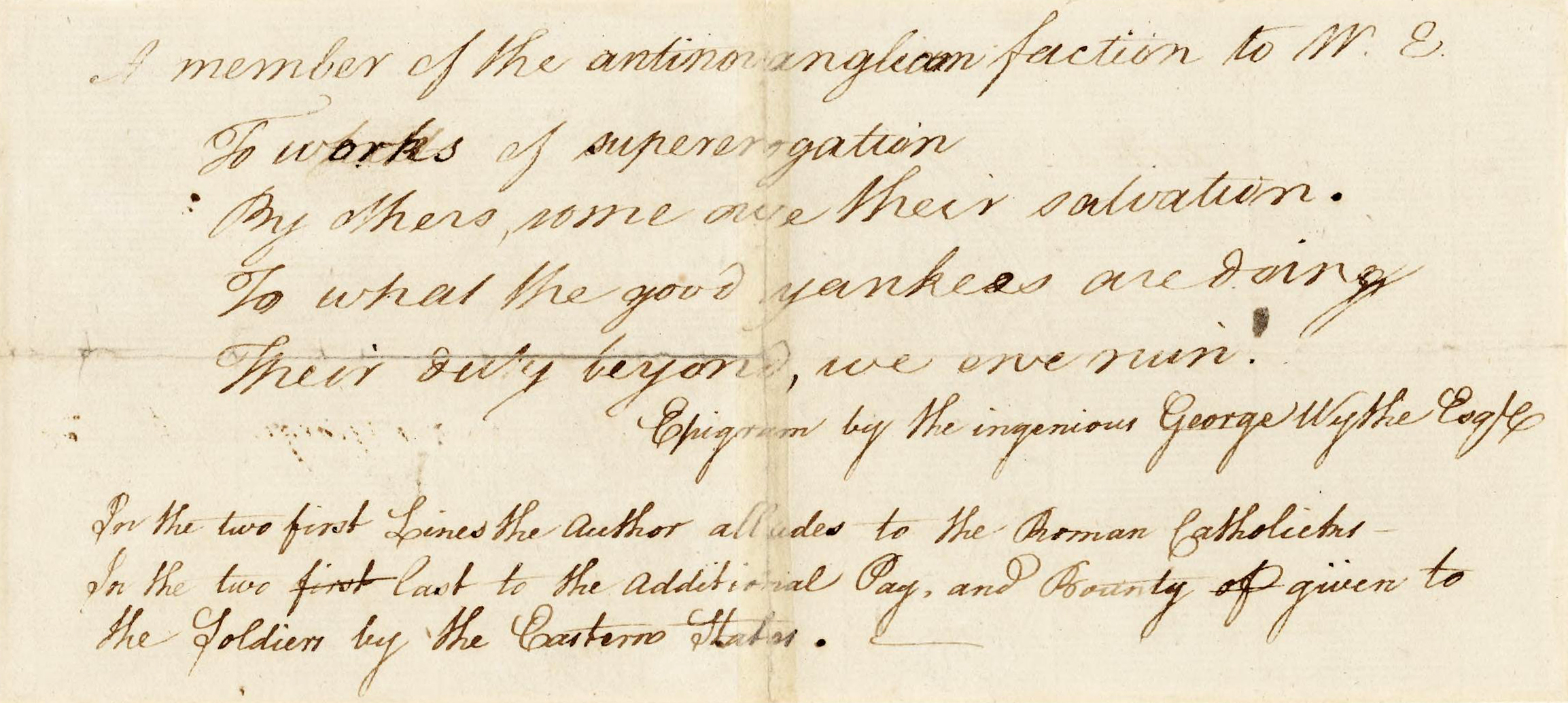 Page seven from Poems on Witty Subjects in Congress, from the Boston Public Library's American Revolutionary War Manuscripts collection. |
"A Novanglican to G.W.," by William Ellery (RI)
|
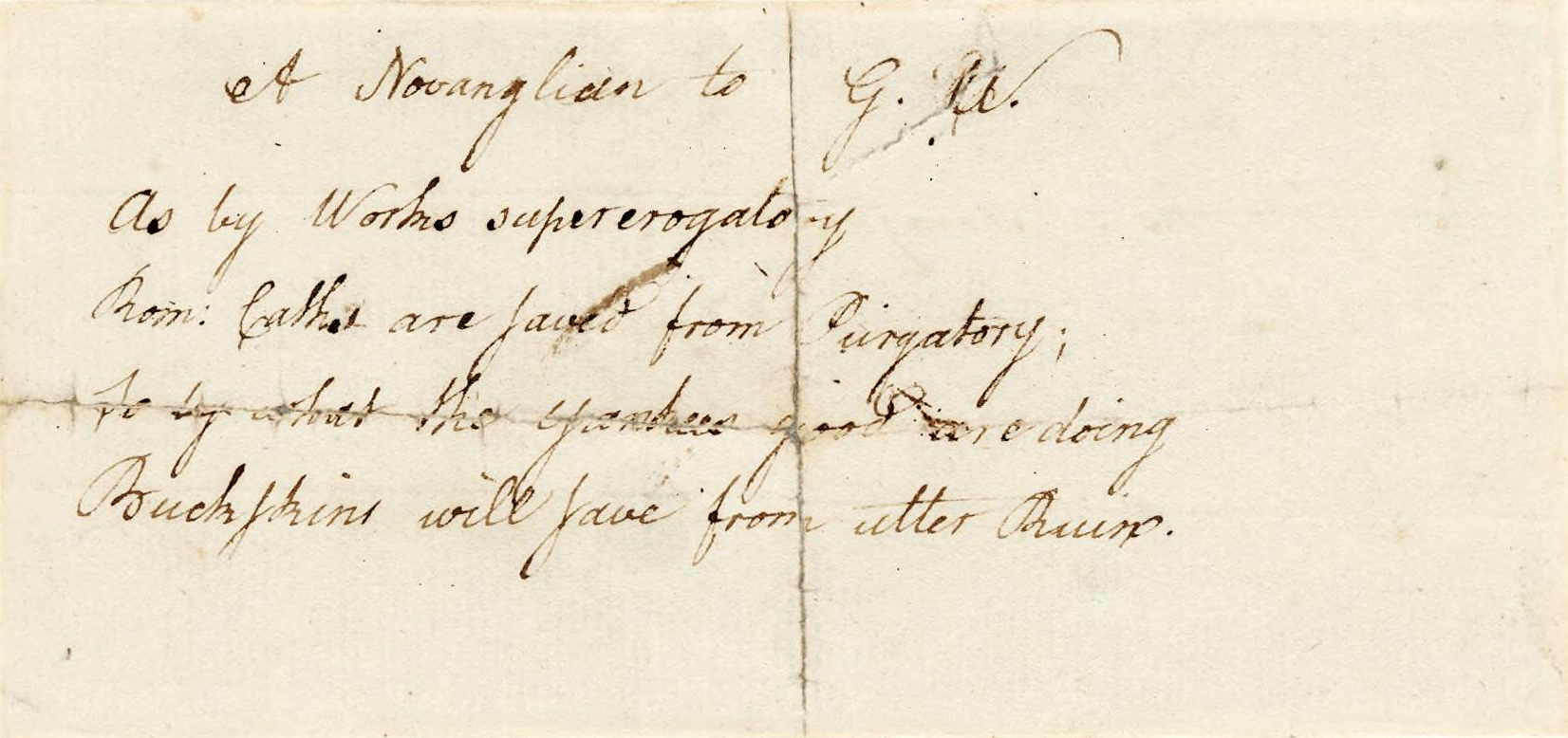 Page three from Poems on Witty Subjects in Congress, from the Boston Public Library's American Revolutionary War Manuscripts collection. |
"Instead of Controlling Our Mary's Cross Humor," by William Ellery
|
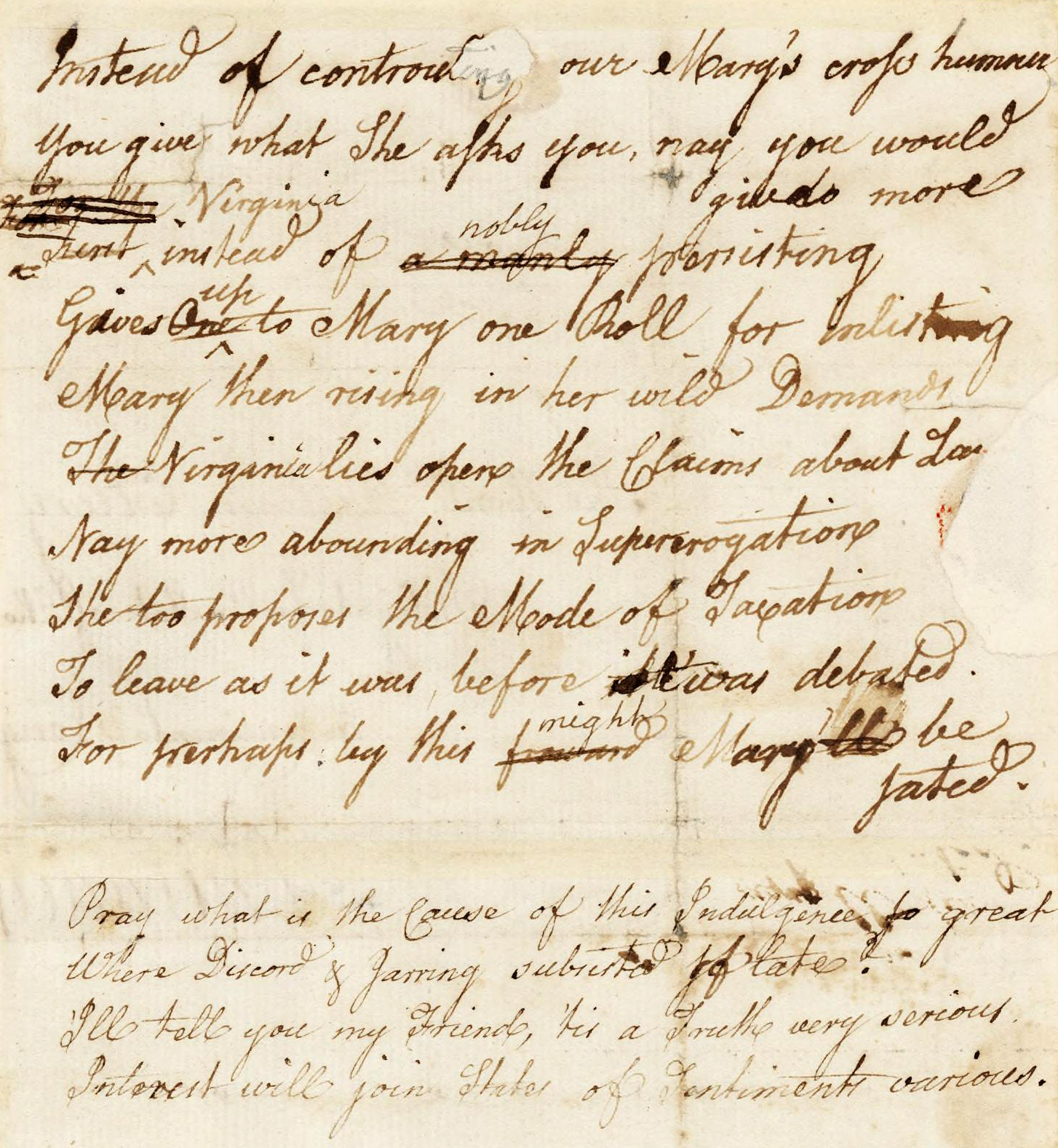 Page five from Poems on Witty Subjects in Congress, from the Boston Public Library's American Revolutionary War Manuscripts collection. |
"For Farms in Utopia, the Moon, or Some Fairyland," by George Wythe
|
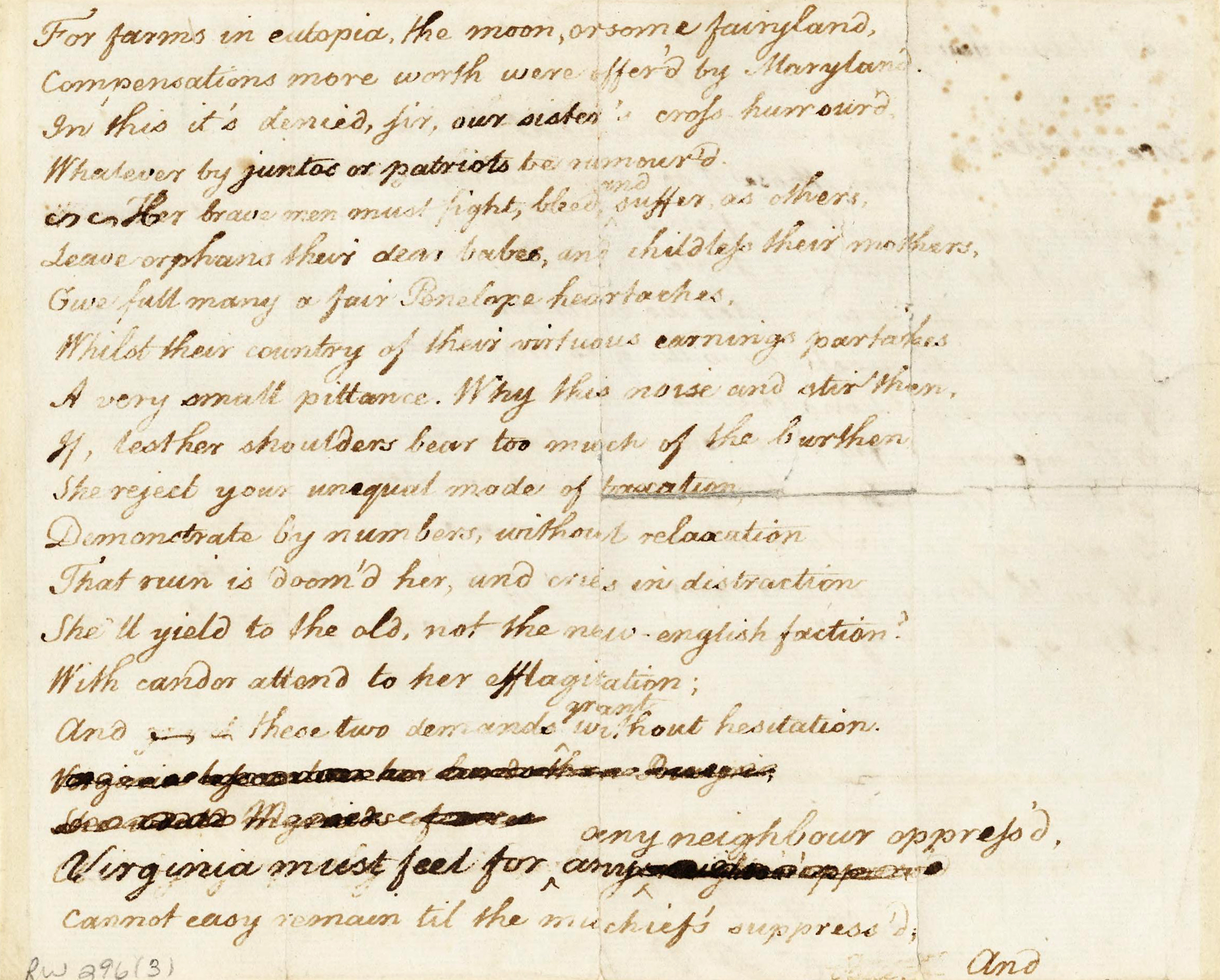 Page nine from Poems on Witty Subjects in Congress, from the Boston Public Library's American Revolutionary War Manuscripts collection. | |
|
And if slaves you include in your capitation, |
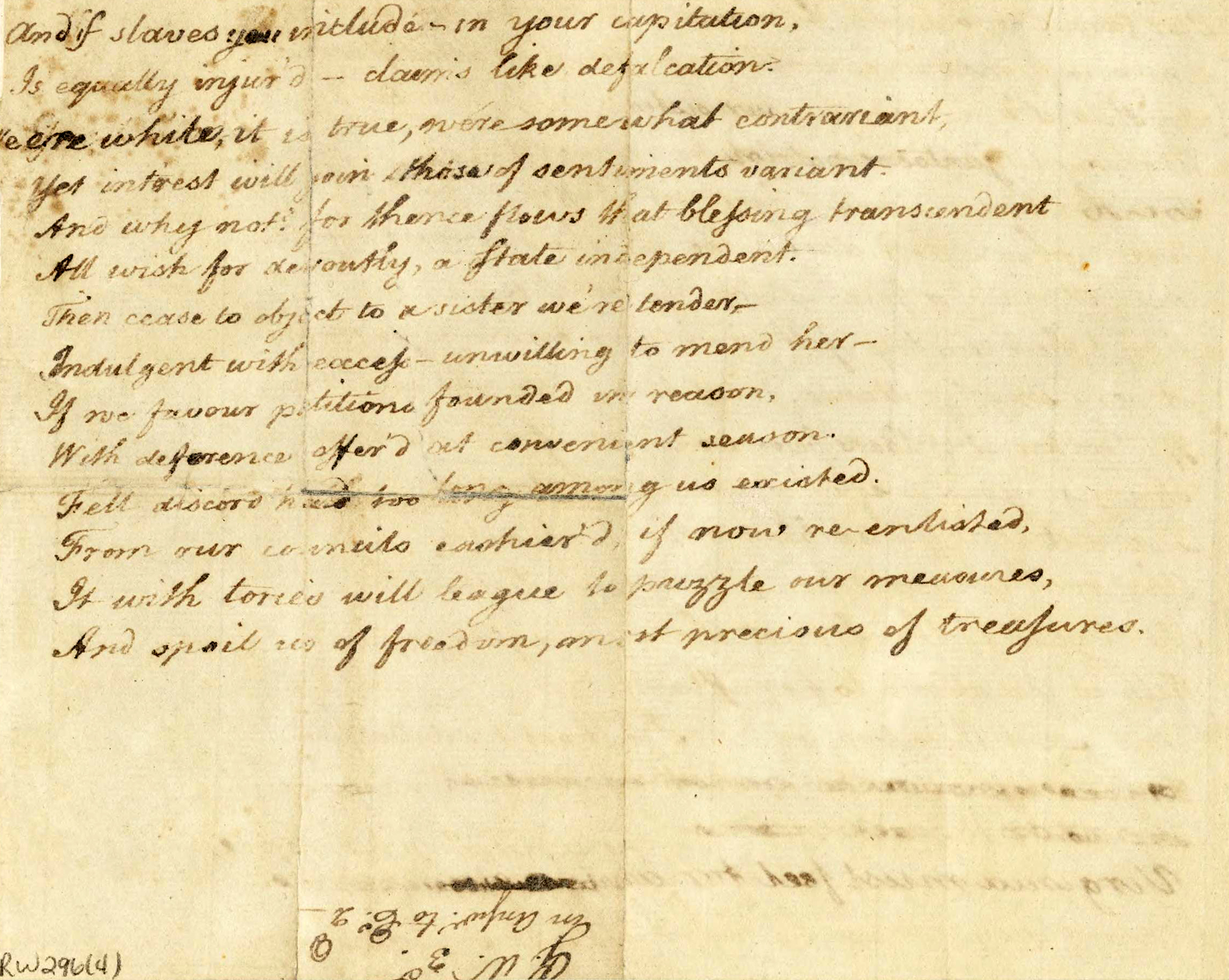 Page ten from Poems on Witty Subjects in Congress, from the Boston Public Library's American Revolutionary War Manuscripts collection. |
"Epigram," by William Ellery
|
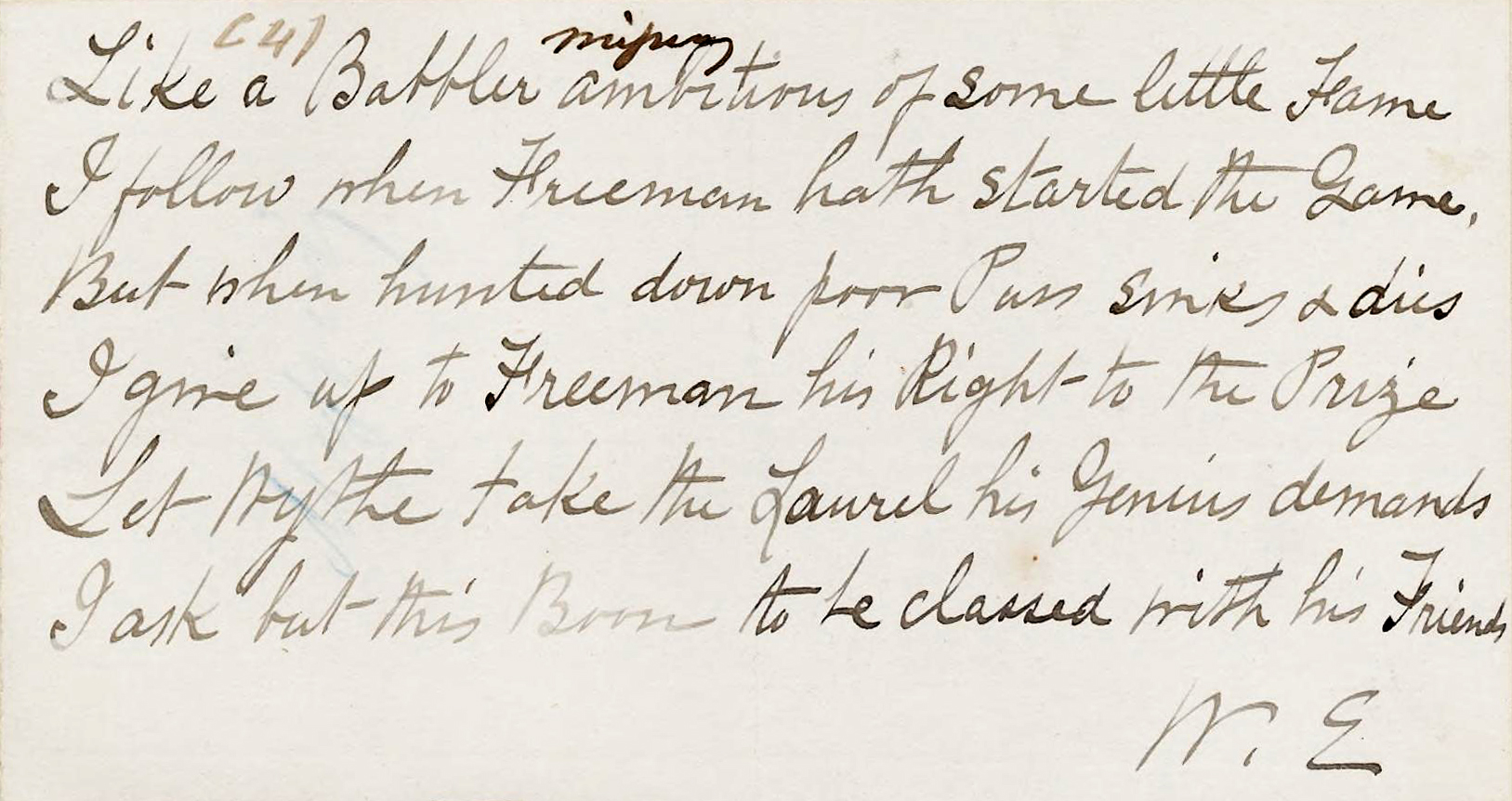 Page eleven from Poems on Witty Subjects in Congress, from the Boston Public Library's American Revolutionary War Manuscripts collection. |
"Answer to Epigram," by George Wythe
|
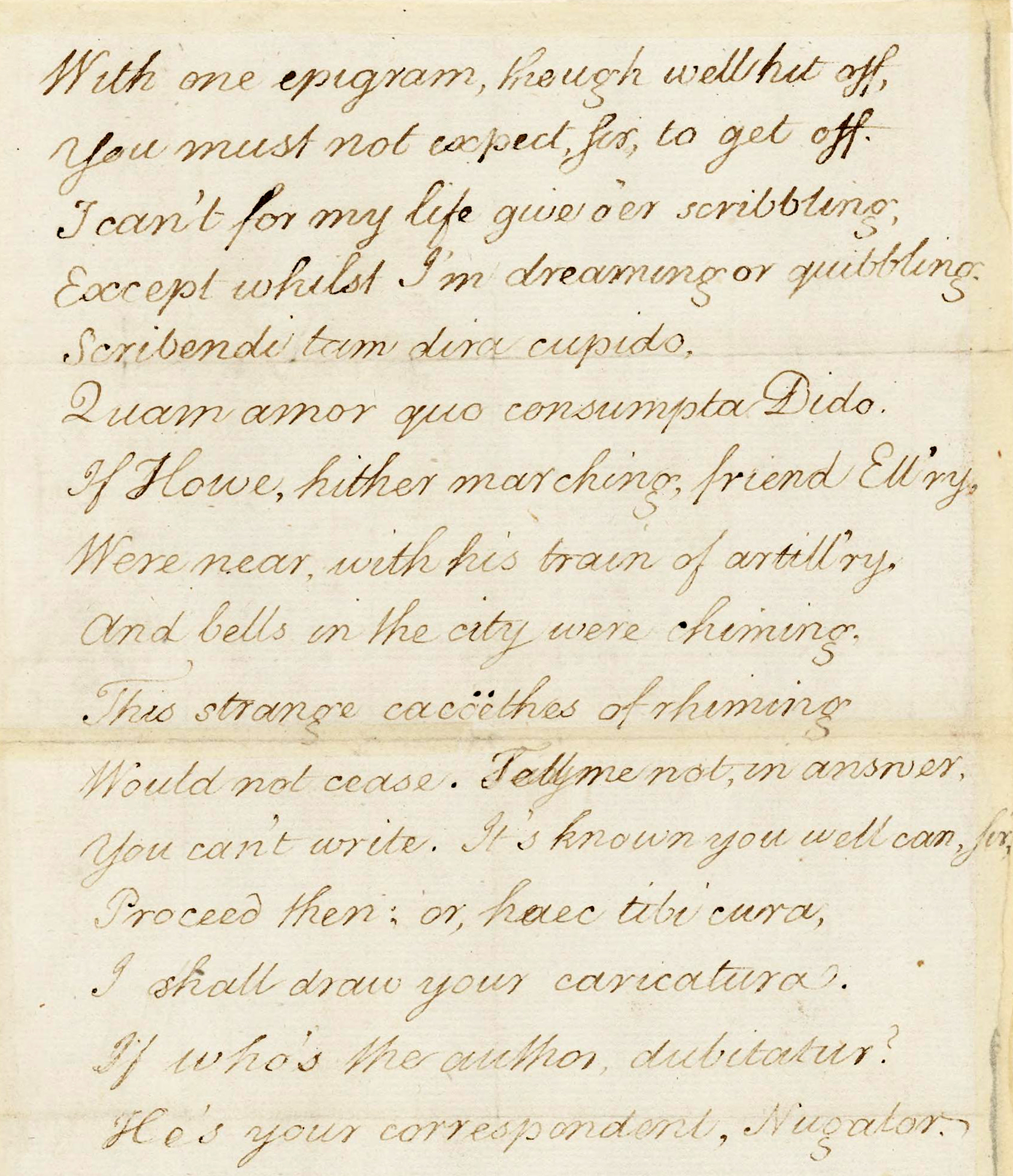 Page twenty-one from Poems on Witty Subjects in Congress, from the Boston Public Library's American Revolutionary War Manuscripts collection. |
"Unless You Will Take One Line for Your Ten," by William Ellery
|
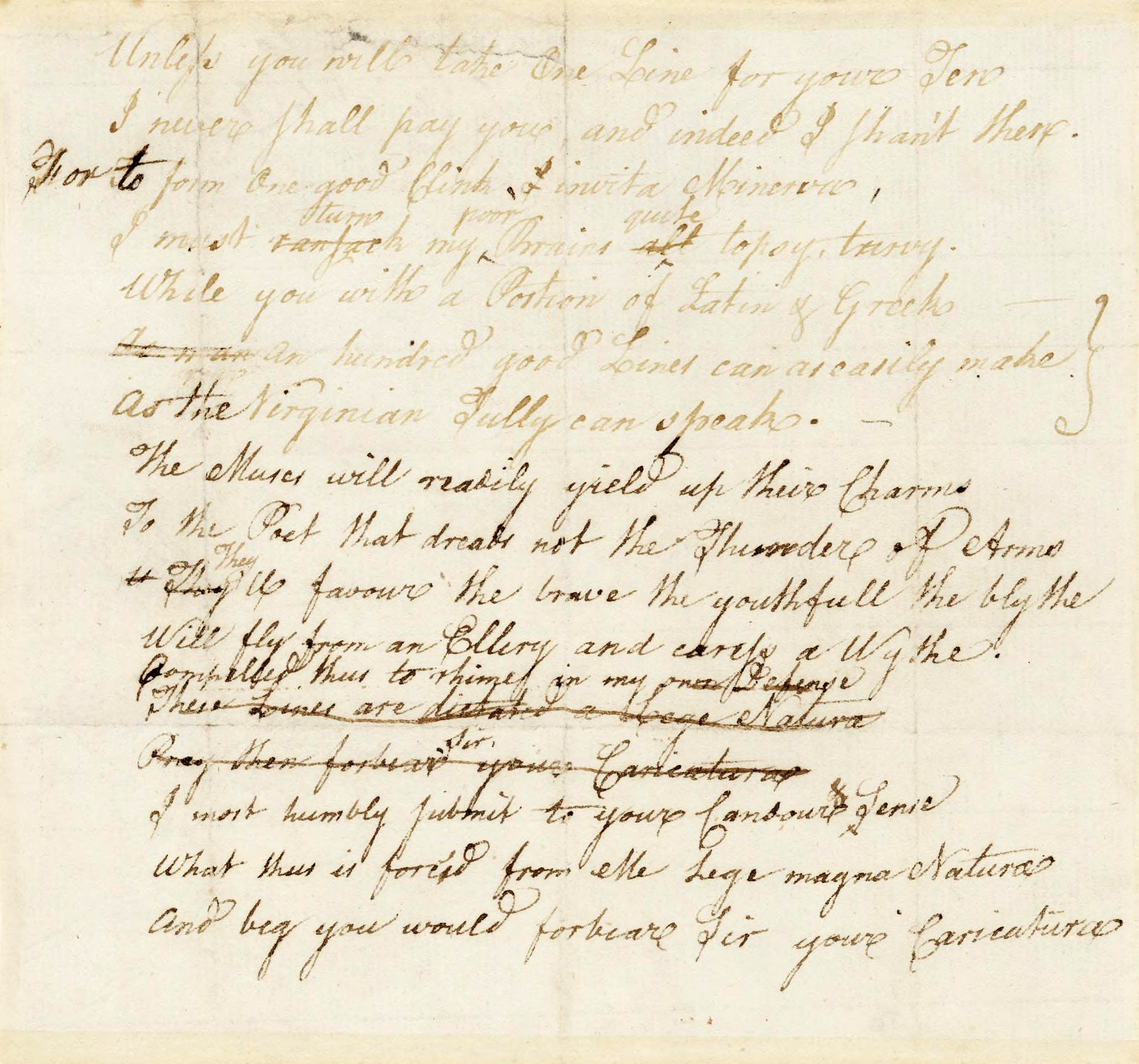 Page twenty-three from Poems on Witty Subjects in Congress, from the Boston Public Library's American Revolutionary War Manuscripts collection. |
"You've Not only Quitted Your Arrear," by George Wythe
|
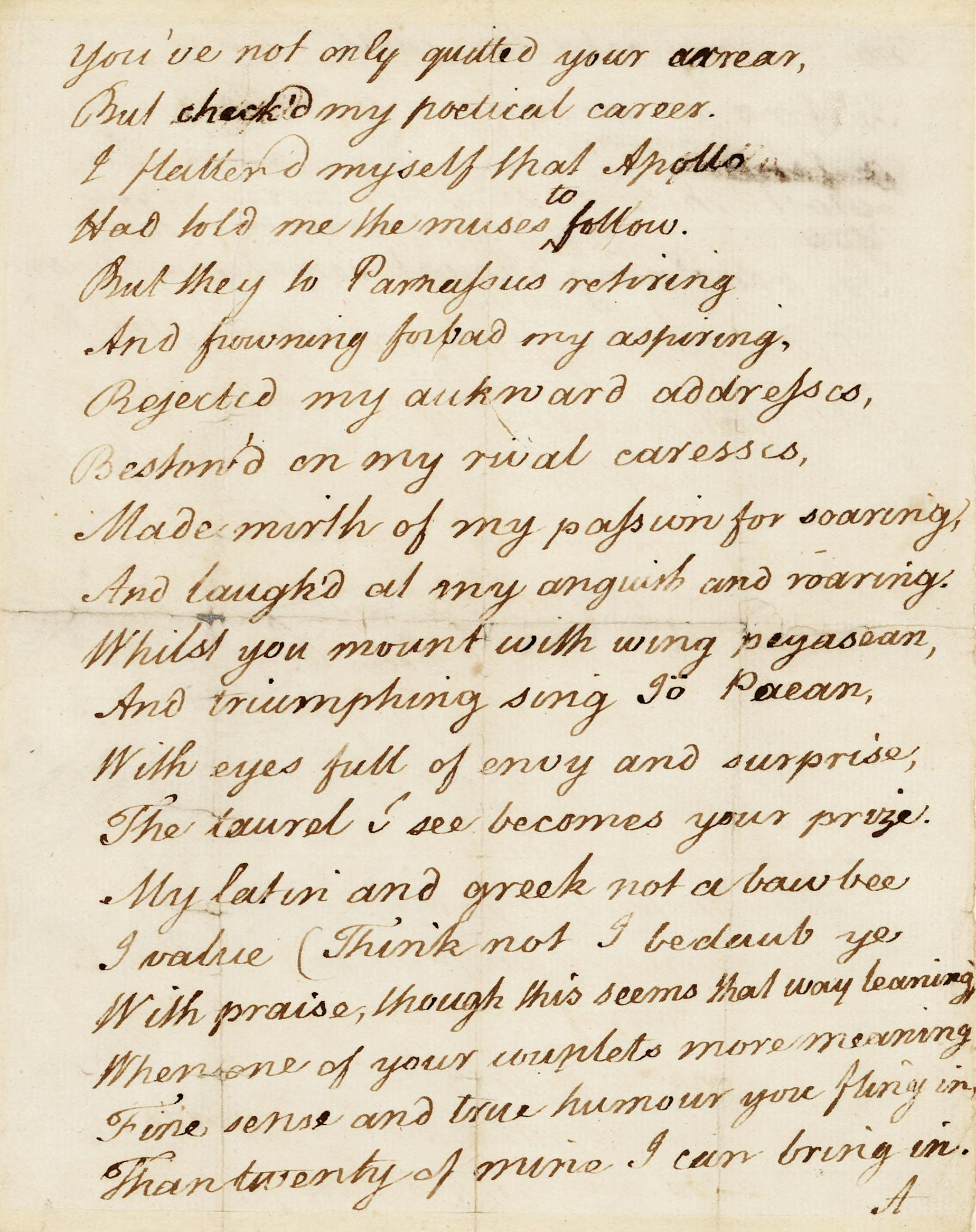 Page fifteen from Poems on Witty Subjects in Congress, from the Boston Public Library's American Revolutionary War Manuscripts collection. |
"Some Mere Poetaster Call Tully," by George Wythe
|
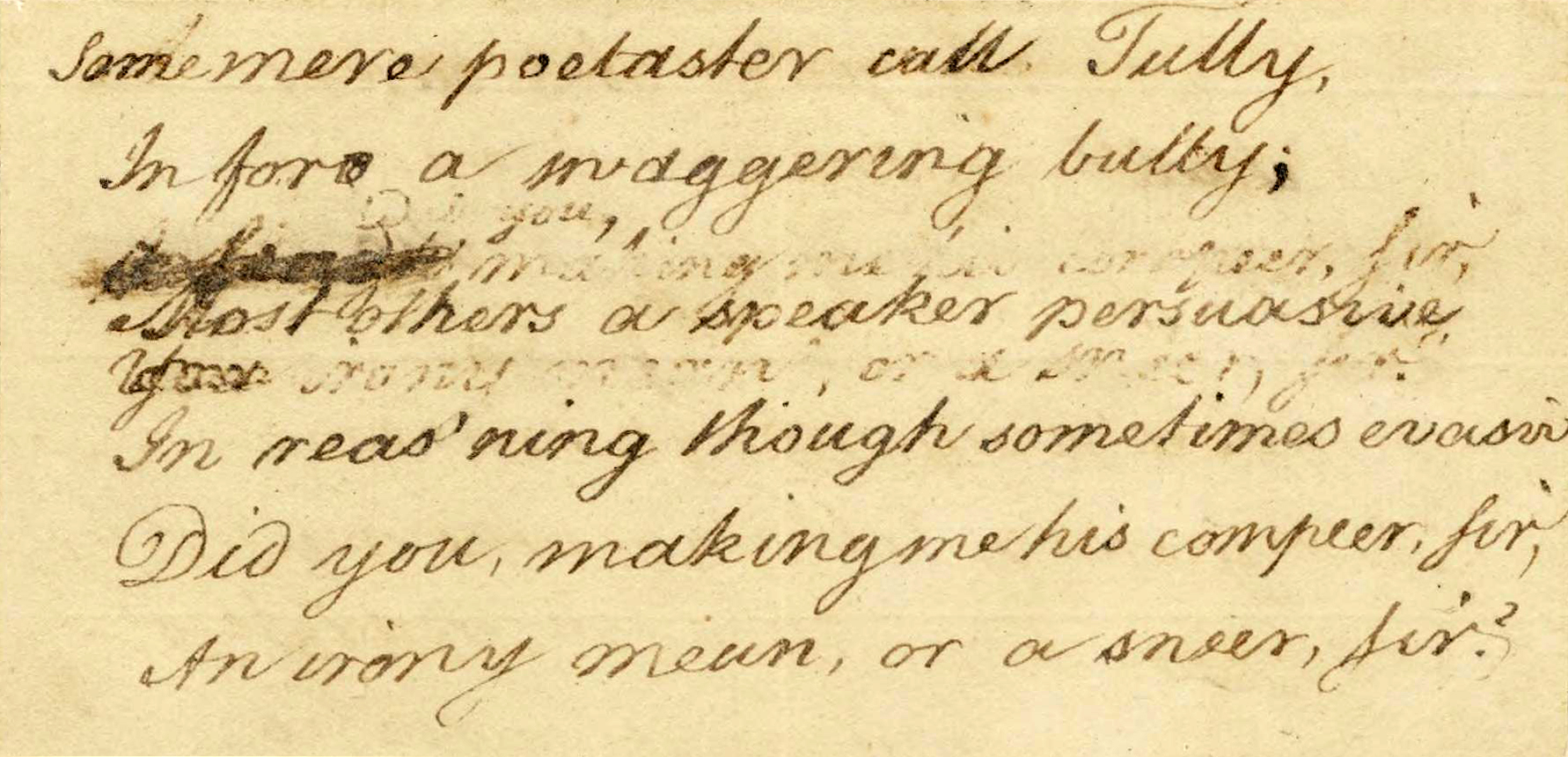 Page sixteen from Poems on Witty Subjects in Congress, from the Boston Public Library's American Revolutionary War Manuscripts collection. |
"The Gen'rous Idea Your Last Piece Expresses," by William Ellery
|
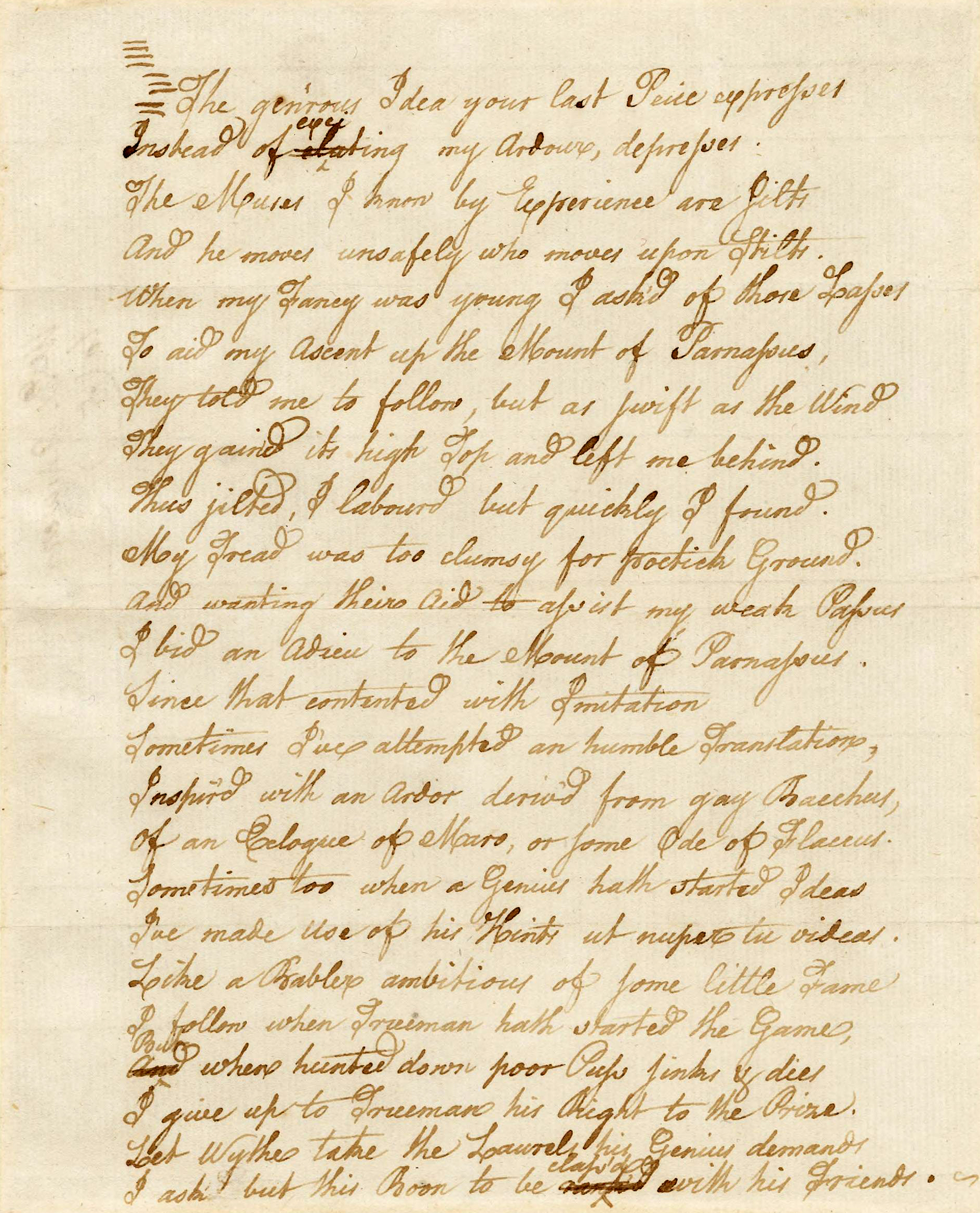 Page twenty-five from Poems on Witty Subjects in Congress, from the Boston Public Library's American Revolutionary War Manuscripts collection. |
"A Commissioner, to the People of Philadelphia," by William Ellery
In this poem, Ellery chastises the conservative position of Andrew Allen, delegate from Pennsylvania, for his commonwealth's reluctance to support independence from Great Britain. The first letter of each line spells out "ANDREW ALLEN". Ellery apparently attempted to get the poem published, as there is another draft with the lines transposed to avoid obvious "libellus famosos" (libel), and a dialogue with the reluctant printer:
|
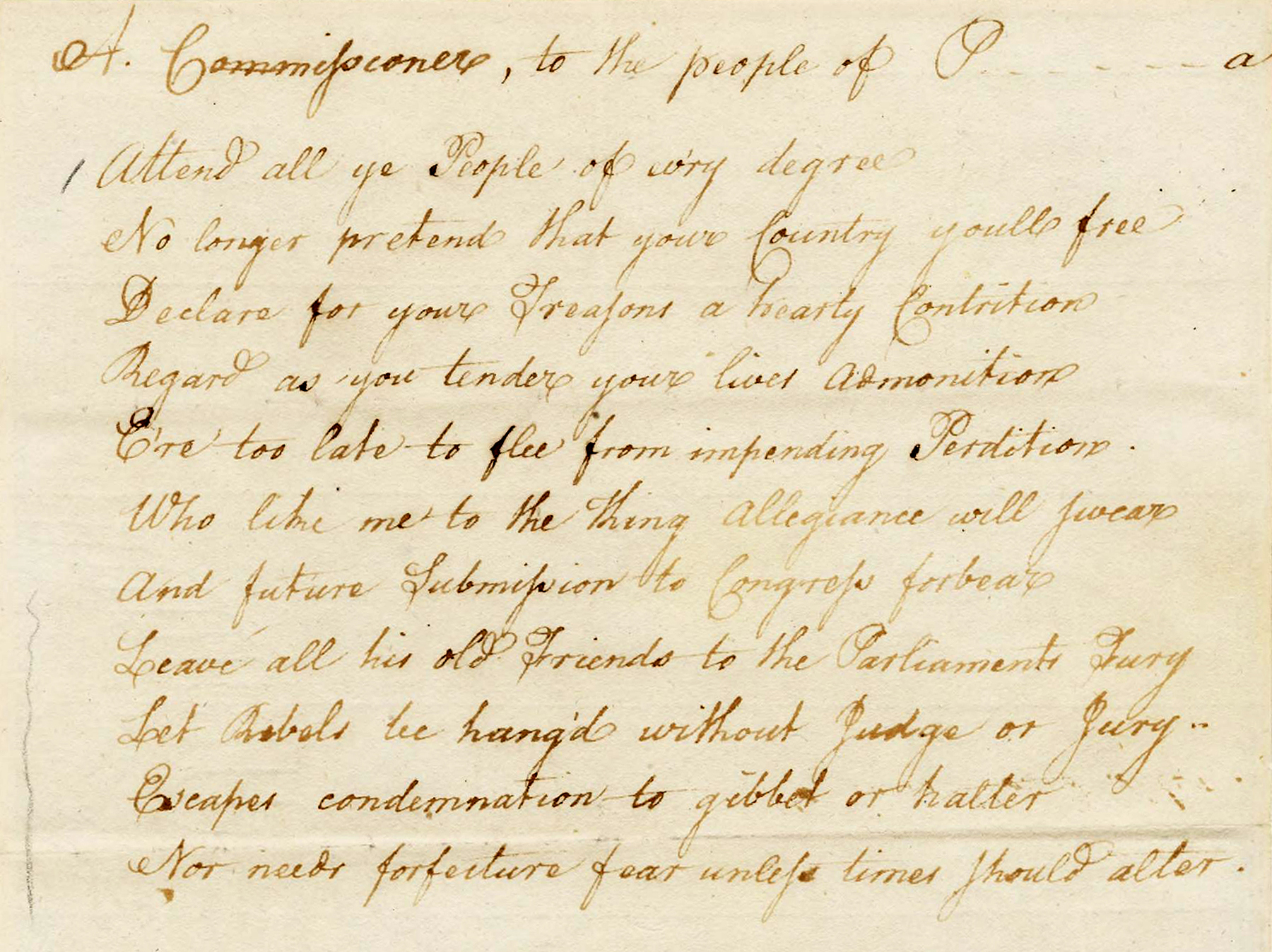 Page one from Poems on Witty Subjects in Congress, from the Boston Public Library's American Revolutionary War Manuscripts collection. |
|
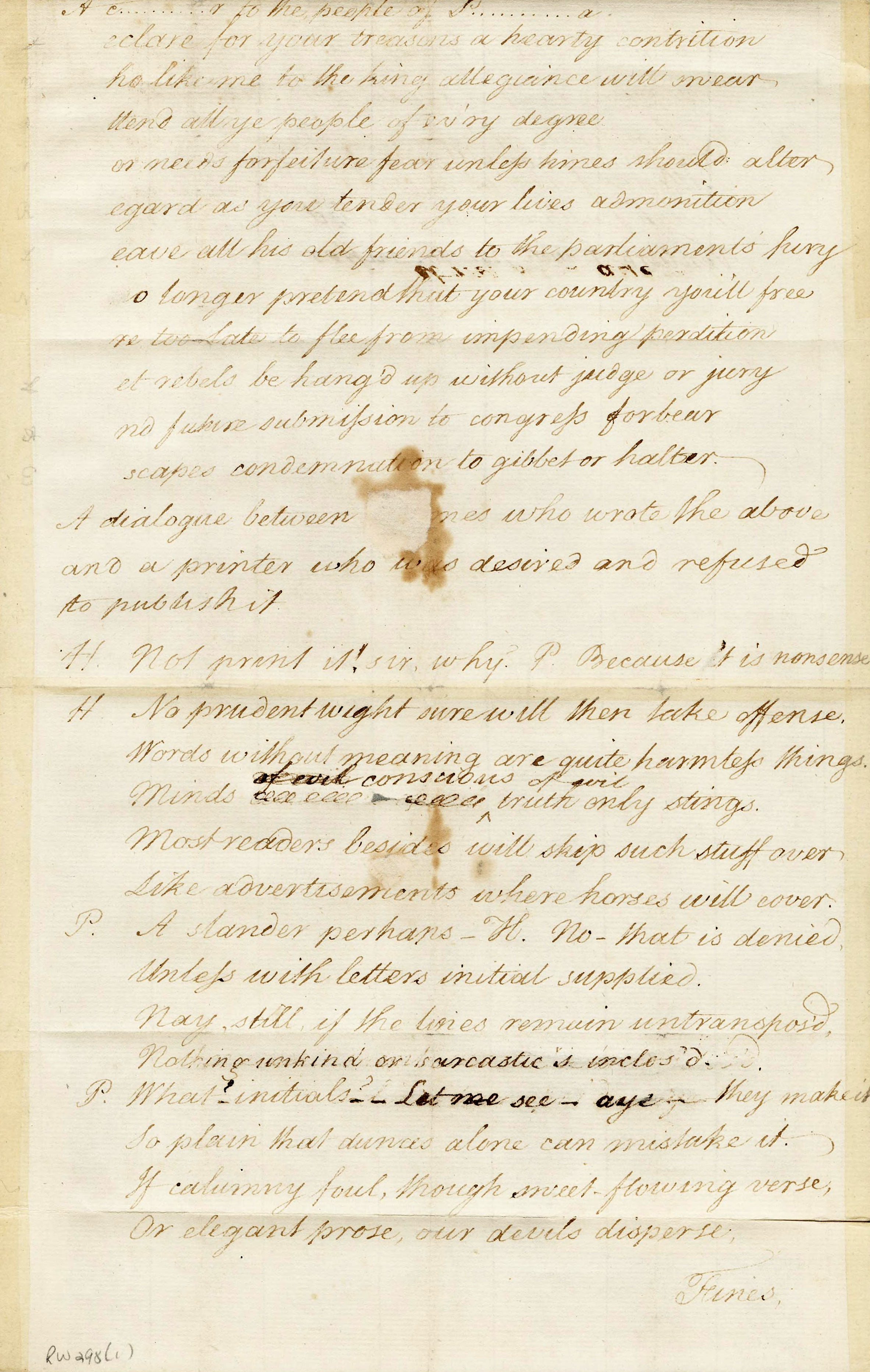 Page nineteen from Poems on Witty Subjects in Congress, from the Boston Public Library's American Revolutionary War Manuscripts collection. | |
|
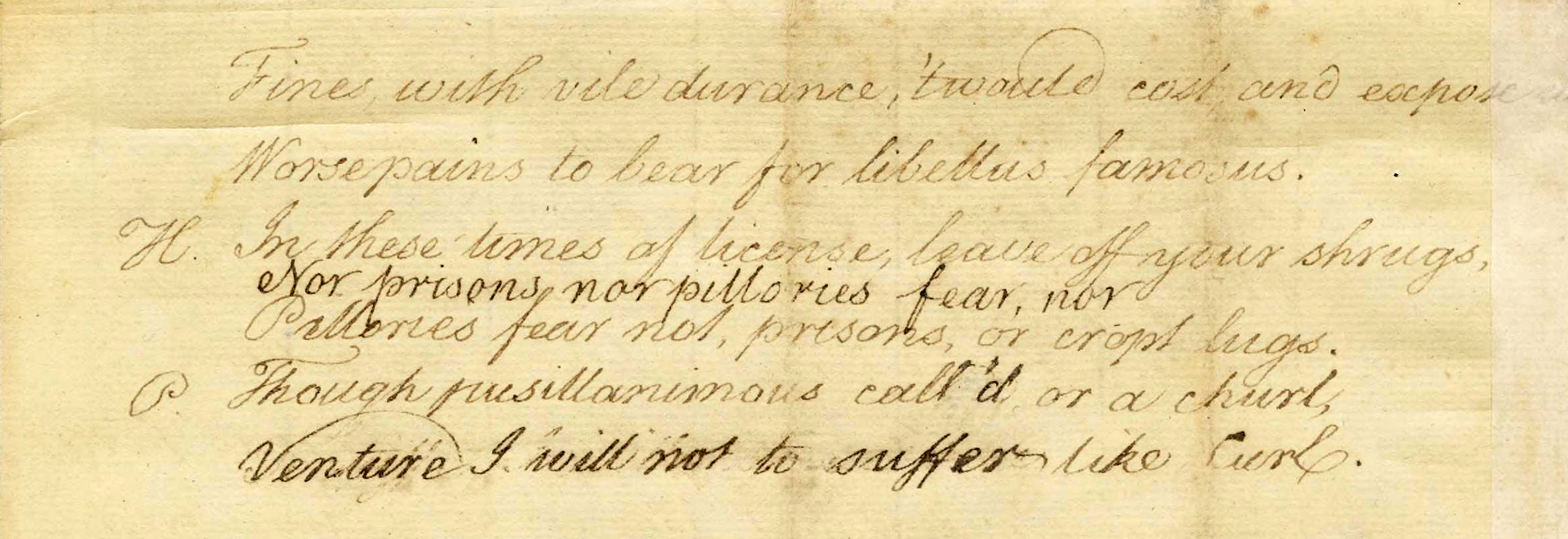 Page twenty from Poems on Witty Subjects in Congress, from the Boston Public Library's American Revolutionary War Manuscripts collection. |
See also
References
- ↑ See W. Edwin Hemphill, "George Wythe Courts the Muses," William and Mary Quarterly 3rd ser., 9, no. 3 (July 1952), 338-345.
- ↑ "Novanglian": New Englander.
- ↑ "Dire desire to write," paraphrase of Virgil, Aeneid, Book V, line 721.
- ↑ "The love which consumed Dido," Queen of Carthage.
- ↑ Ovid, Ex Ponto III, xxxvi.
- ↑ Jester, clown.
- ↑ Defy nature, literally "go against Minerva's will." Cicero, De Officiis, I, 31, 110.
- ↑ Wythe is a Virginian Cicero: [[wikipedia:Marcus Tullius Cicero|]].
- ↑ A great law of Nature.
- ↑ Classical Greek cry of exultation or triumph, traditionally addressed to Apollo the healer.
- ↑ "As of late, you see."
- ↑ Possibly a reference to the colonial punishment of cutting off ears?
- ↑ [[wikipedia:Edmund Curll|]] (c. 1675 – 1747), whose name was synonymous with "unscrupulous publication and publicity."
External links
- Boston Public Library, Special Collections.
- American Revolutionary War Manuscripts at the Boston Public Library, Internet Archive.
- Read these poems in the Internet Archive.